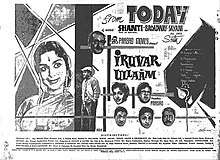Iruvar Ullam
| Iruvar Ullam | |
|---|---|
 Theatrical release poster | |
| Directed by | L. V. Prasad |
| Produced by | Anand |
| Written by | M. Karunanidhi |
| Based on |
Pen Manam by Lakshmi Thiripurasundari |
| Starring |
Sivaji Ganesan B. Saroja Devi M. R. Radha T. R. Ramachandran S. V. Ranga Rao |
| Music by | K. V. Mahadevan |
| Cinematography | K. S. Prasad |
| Edited by | A. Sanjeevi |
Production company |
Prasad Movies |
Release date |
|
Running time | 165 minutes |
| Country | India |
| Language | Tamil |
Iruvar Ullam (English: Two Hearts) is a 1963 Tamil-language drama film directed by L. V. Prasad. The film was produced by Anand under Prasad Movies and stars Sivaji Ganesan and B. Saroja Devi in the lead roles, while M. R. Radha, T. R. Ramachandran and S. V. Ranga Rao play pivotal roles. The film's soundtrack and background score were composed by K. V. Mahadevan, while the lyrics for the songs were written by Kannadasan.
K. S. Prasad and A. Sanjeevi handled cinematography and editing respectively. The film was a remake of Telugu film Bharya Bharthalu (1961) which was based on novel Pen Manam written by Lakshmi Thiripurasundari. Screenplay and dialogues were written by M. Karunanidhi. The film was released on 29 March 1963 and became successful at the box office.
Clips of the film makes an appearance to portray the younger sivaji and saroja in Once More.
Cast
- Sivaji Ganesan as Selvam
- B. Saroja Devi as Shantha
- M. R. Radha as Sigamani
- T. R. Ramachandran
- S. V. Ranga Rao as Selvam's father
- N.R. Sandhya as Selvam's mother
- K. Balaji in a cameo appearance
- Padmini Priyadarshini
- S. Ramarao as Shantha's father
- A. Karunanidhi as Soda Subbaiah
- T. P. Muthulakshmi as Sigamani's wife
- Jayanthi in a cameo appearance
Production
The film was a remake of Telugu film Bharya Bharthalu which was adapted from the novel Pen Manam written by Lakshmi Thirupasundari.[2] The screenplay and dialogues were written by Karunanidhi.[3]
Soundtrack
The film's soundtrack and background score were composed by K. V. Mahadevan, while the lyrics for the songs were written by Kannadasan.[4][5] The audio was released under the label Saregama.[6]
- Paravaigal Palavitham - TM Soundarrajan
- Idhayaveenai - P Susheela
- Azhagu Srikkindrathu - TMS, P Susheela
- Nadhi Enge - TMS, P Susheela
- Yaen Azhuthai - TMS
- Kanne - P Susheela
- Buddhi Sigamani - AL Raghavan, L.R.Eswari
- Kannethire - TMS
Marketing
The film was promoted creatively as a newspaper cutting that featured pencil sketches of two hearts each bearing the name of the hero and the heroine.[7]
References
- ↑ "filmography p9". nadigarthilagam.com.
- ↑ "Bharya Bharthalu (1961) - The Hindu". The Hindu. Retrieved 28 April 2016.
- ↑ "Google Groups". google.com.
- ↑ "iTunes - Music - Iruvar Ullam by T. M. Sounderarajan". iTunes.
- ↑ "Iruvar Ullam". Gaana.com.
- ↑ "Iruvar Ullam". Saregama.
- ↑ K. JESHI. "Just like that". The Hindu.
External links